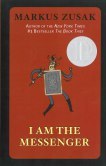Devon Trevarrow Flaherty's Blog, page 62
June 1, 2015
Reading 1-2-3
Oh, I can read like a champ. I mean, I can get all snuggled up in a corner of the couch with my favorite Navajo blanket and a glass of ice water, a black ball-point pen and a Burt’s Bees chapstick and read for hours. And I cover some ground, man! I can read fiction and non-fiction, from children’s to literary, from poetry to plays. I even take my skills with me on the road, reading cereal boxes and road signs like a pro!
But when it comes to reading, I’m still a little bit out of my depth.
Why-oh-why is the English language so confusing? Why do we constantly use one word to mean two or three or even ten different things? I believe we are in the way of a misunderstanding here. Yes, “reading” means deciphering symbols to understand meaning and it also means–just a variation, really–doing this with a whole lot of symbols, at once, to understand an entire story. “Reading” can be done silently or audibly.
“Reading” is also when an author appears in front of an audience and speaks out loud some of the contents of their work. It can also refer, more generally, to the event at which the author does the “reading,” which can include an introduction, speaking, book sales, a display, information, Q&A, and a book signing.
This second “reading” is where I am out of my depth.
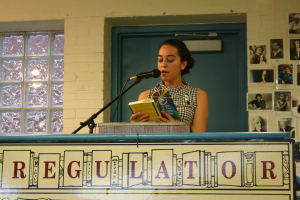 I had my second formal reading for the release of a novel, a couple weeks ago. After my two years as a published author, you may be surprised it is only my second, but let me explain. On-the-ground book tours are a dying breed. For one, small bookstores are a dying (or at least waning) breed. For two, they cost a lot of money and don’t tend to generate a ton of it back. (For an exception, look into the life and times of Christopher Paolini.) For three, the cost is often on the author, and most the time that author doesn’t have money to throw around, let alone two nickles to rub together. For four, it is very, very difficult to get people to come out to a book reading. There are just too many darned entertainment and community options for people, now, like every single night of their lives. It’s super-stiff competition. And for five, many modern book “tours” are done online. They often call this a Blog Tour. I call it that, and also head it under “Virtual Launch.”
I had my second formal reading for the release of a novel, a couple weeks ago. After my two years as a published author, you may be surprised it is only my second, but let me explain. On-the-ground book tours are a dying breed. For one, small bookstores are a dying (or at least waning) breed. For two, they cost a lot of money and don’t tend to generate a ton of it back. (For an exception, look into the life and times of Christopher Paolini.) For three, the cost is often on the author, and most the time that author doesn’t have money to throw around, let alone two nickles to rub together. For four, it is very, very difficult to get people to come out to a book reading. There are just too many darned entertainment and community options for people, now, like every single night of their lives. It’s super-stiff competition. And for five, many modern book “tours” are done online. They often call this a Blog Tour. I call it that, and also head it under “Virtual Launch.”
Oh yeah, and for six, authors generally dislike doing them. We tend (strongly) to be an introverted lot and we spend most of our time all alone. It can be very daunting for many of us to get in front of an audience of any size, especially to air our work and bare our souls.
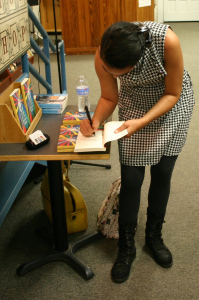 But I have had an actual brick-and-mortar (The Regulator Bookshop in Durham) host a reading and signing for my book launch, both times. Both events sold around ten books and were mostly populated by friends and family. So why did I do them at all? Really, I see this launch signing as an opportunity to celebrate and to throw a stake down into the ground. Published! Book done! Let’s party! (and wait with bated breath for the real milestone–the people-are-actually-buying-it-and-reading-it milestone). It helps that I am actually comparatively comfortable in front of a crowd, because I have spent a lifetime in front of one as a singer, actor, instrumentalist, and even teacher and speaker. I still find doing a reading one of the most nerve-wracking things I do, but it’s not terrible. And I “read” well. Meaning, I read out loud well, especially my own stuff. (Not to the level on those Spoken Word people, mind you, but better than the average high school Romeo and Juliet.)
But I have had an actual brick-and-mortar (The Regulator Bookshop in Durham) host a reading and signing for my book launch, both times. Both events sold around ten books and were mostly populated by friends and family. So why did I do them at all? Really, I see this launch signing as an opportunity to celebrate and to throw a stake down into the ground. Published! Book done! Let’s party! (and wait with bated breath for the real milestone–the people-are-actually-buying-it-and-reading-it milestone). It helps that I am actually comparatively comfortable in front of a crowd, because I have spent a lifetime in front of one as a singer, actor, instrumentalist, and even teacher and speaker. I still find doing a reading one of the most nerve-wracking things I do, but it’s not terrible. And I “read” well. Meaning, I read out loud well, especially my own stuff. (Not to the level on those Spoken Word people, mind you, but better than the average high school Romeo and Juliet.)
As this past reading at The Regulator approached, I found myself really wanting to give it some pizazz; to make it worth coming out for. So what did I do? Googled ideas. And guess what. There were none. There were several articles on how to behave at a reading, though. So I am going to combine this reading etiquette stuff with some more anecdotal ideas of my own, in hopes that it helps liven up the world of “readings.”
Say thank you. Do not forget this! It is basically the only universal tip out there. Thank the person who introduced you, the place that is hosting you, and your audience for coming.
Dress nicely, but make sure that you are comfortable. Look clean and tidy. Ball gown not necessary, nor is business attire if that is not your style. Throw on some earrings and brush your cowlick flat, you know.
Think outside the box to make it a little lively. Make the reading a journey, a story, or a game. I made my last reading a revelation of how the new novel had come to be: out of the legends of my last novel. I also revealed how it would be continuing in the future. You could also make it interactive (besides the Q&A) or take it to the next level with technology. (Make sure, though, that you are keeping the basics. You need to read excerpts from your highlighted work, have a question time, and tell the audience about yourself and your current project.)
Learn how to speak publicly. You may want to take a class, but you could also troll YouTube (in the metaphorical fishing sense) or read a book about it. You are going to want to learn to project your voice, speak slowly when nervous, enunciate, modulate your voice (and even act a little), smile, look at people, keep your face clear of objects (like books), etc.
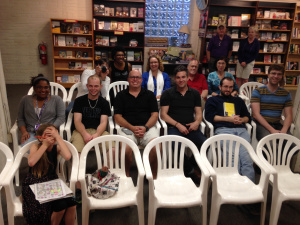 Practice! Practice speaking in general, but also practice for this reading. Time your pieces and mark them so that you can roll with the punches. Know what you are going to say before the reading, during the transitions, and at the end. Know how you are going to sign your name, on what page, and with what little saying. Then practice again. Only recently–after thirty years of performances–have I learned the value of muscle memory, including your brain-the-muscle. The more times you go over everything, the more your body will just do it without your conscious interference and this makes for a much smoother performance.
Practice! Practice speaking in general, but also practice for this reading. Time your pieces and mark them so that you can roll with the punches. Know what you are going to say before the reading, during the transitions, and at the end. Know how you are going to sign your name, on what page, and with what little saying. Then practice again. Only recently–after thirty years of performances–have I learned the value of muscle memory, including your brain-the-muscle. The more times you go over everything, the more your body will just do it without your conscious interference and this makes for a much smoother performance.Bring what you need. Even bring what you might-possibly need. This includes: pens (like many of them), a Sharpie, water (for yourself), layered clothes (to deal with temperature variances), a snack (to deal with tanking blood sugar), and your reading material with the marked passages. The bookstore or other location will let you know if you should bring copies of your books. Also, a signed picture of yourself would be appropriate for many venues. In the event that you are hosting this alone, you will also need signage, lots of change, and a way of taking credit cards (like Square). I would also recommend a helper/wing-man.
Be on time. In fact, be fifteen or more minutes early. Familiarize yourself with the place and the host. Nuff said.
Be open and flexible and thankful and nice and above all, likeable and interesting. That’s a pretty tall order, but really concentrate on each of these things. Open to ideas and changes. Flexible when the plans change or something goes wrong (which it will). Thankful for the opportunity and venue and anyone who shows up. Nice to every single person involved in the whole evening. Likeable (as in not sarcastic or self-deprecating or snobby or rude or too shy). As interesting as you can manage to be, which is going to largely come from practicing and from being confident (or at least projecting confidence), highlighting your incredible work and underlining your interesting life and personality. Remain calm.
Know thy audience. Kids? SF/F buffs? The regulars? Your audience will determine how you behave and present, obviously. Don’t swear at kids (and speak more animated and have visuals). Don’t hate on The Game of Thrones to the SF/F crowd (and wear your best X-Files shirt and use ten-dollar science words).
Understand marketing. This is a long goal, of sorts, but these days all us writers (and especially indie pubbers) need to understand marketing to a point. When we get really comphy with how to best market–and not market–our product (which is us, incidentally, and our books), we will have much more fulfilling and productive interactions with our readers. Use the internet and/or books for this one, too, as well as trade magazines. And keep at it, updating your knowledge over time.
Ask people to spell names. Do not, under any circumstances, sign a book with a name without verifying the spelling! Even for Jim! Or Bob! I am so not kidding.
Now get on the phone or your e-mail and get yourself out there. It is likely there are local bookstores and libraries that would be happy to have you come in for a book reading or another author event, even if you have not recently published. It’s nothing to be afraid of, especially with these awesome tips.


May 28, 2015
Something New
Sometimes things are just what you expect, but they are not at all what you expected. Thus went the first inaugural Read Local NC Book Festival. I participated in a number events on Sunday only, and every one of them went just about how I thought it would and yet was not at all what I thought it would be.
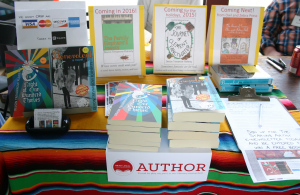 I thought the reception would be a couple dozen authors and bookish people mulling about a table of light brunch items, chatting and sipping and being convivial yet subdued. And it was. However, what I didn’t see coming was
I thought the reception would be a couple dozen authors and bookish people mulling about a table of light brunch items, chatting and sipping and being convivial yet subdued. And it was. However, what I didn’t see coming was
the awkward air of two dozen introverts
meeting real, live NC author celebrities but not even being able to tell until later research verification
the whirling circular sharing of impressivity and mutual respect with just a tad bit pity or patronization
the diminutive size of the finger foods which I would care nothing about because I was too anxious to eat
the mental exhaustion after just one hour of trying to hold my end of an adult conversation with strangers
the two giant glasses of water which I would drink out of nervousness and would lead to–later in the day–two more water bottles, three tiny water bottles, and three more giant cups of water
 I thought the book fair would involve rows of tables outdoors, banners flapping in the wind, stacks and stacks of books with people milling about, and the incessant rise and fall of the PA from main stage on the spring breeze. And it did. However, what I didn’t see coming was
I thought the book fair would involve rows of tables outdoors, banners flapping in the wind, stacks and stacks of books with people milling about, and the incessant rise and fall of the PA from main stage on the spring breeze. And it did. However, what I didn’t see coming was
close quarters with our table-neighbors that would necessitate cordial six-hour relationships
Kevin being freed up to be with me all day and allow me to occasionally wander the fair and attend panels, etc.
food truck food
a permanent structure for shading us from the relentless sun on an otherwise perfect day
more awkward introverts
some books to utterly impress me and others to make me (a little too) smug
very low sales but very high networking
how impressed I was by authors who could take the limelight in stride (mostly being kind, thankful, “with it”/informed, and gracious)
the comparatively practical approach to writing that the younger writers (generally) have as opposed to the romantic and insular approach the older ones (generally) have
and finally, lots more awkward introverts
 I thought I would be nervous for the cross-genre readings and that I would fall somewhere in the middle of the reading-well spectrum. And I was and did. However, what I didn’t see coming was
I thought I would be nervous for the cross-genre readings and that I would fall somewhere in the middle of the reading-well spectrum. And I was and did. However, what I didn’t see coming was
how some of the readers very clearly didn’t practice their reading. Even once.
how only a couple of the readers really owned that stage (which wasn’t actually a stage) but not even in the way you would think
my author to be present with like a huge support system and a GIANT camera
the readings to vary so widely, from cookbook entries to baseball stories, and from restaurant owners to cat ladies
Here are some of the people and companies I encountered:
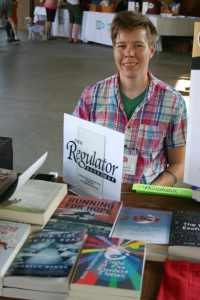 The Regulator Bookshop. Laurin Penland manned the Regulator’s table, which hosted book signings for the panel participants and sold a rather impressive looking collection of local books, including mine. Laurin had just hosted my book signing a few days before, so it was nice to see her sitting there in the center aisle with The Night of One Hundred Thieves in front of her. Only minutes from our home and situated at its original 1970s location on Ninth Street (within the community that has quite literally built up around it), we frequent The Regulator as a family and encourage you to check it out.
The Regulator Bookshop. Laurin Penland manned the Regulator’s table, which hosted book signings for the panel participants and sold a rather impressive looking collection of local books, including mine. Laurin had just hosted my book signing a few days before, so it was nice to see her sitting there in the center aisle with The Night of One Hundred Thieves in front of her. Only minutes from our home and situated at its original 1970s location on Ninth Street (within the community that has quite literally built up around it), we frequent The Regulator as a family and encourage you to check it out.
 I bought a half-table for the fair, which meant that I would be sharing a six-footer with Michael J. DeValve, the author of the academic/criminal justice non-fiction A Different Justice. Writers (and artists) can always find things in common, even if one of them is a professor and the other a novelist. If you have an interest in reading about a different approach for the American justice system, check out the book HERE.
I bought a half-table for the fair, which meant that I would be sharing a six-footer with Michael J. DeValve, the author of the academic/criminal justice non-fiction A Different Justice. Writers (and artists) can always find things in common, even if one of them is a professor and the other a novelist. If you have an interest in reading about a different approach for the American justice system, check out the book HERE.
At the Brunch Reception, as mentioned, I met a couple of local celebrities, or authors that actually make some real money for their novels and get at least a little buzz when they publish. One of them was YA author JJ Johnson. One of the things that impressed me about JJ was her happy marriage to her publisher, Peachtree in Georgia.  And not only is she still happy with them after three books, they have done an incredible job on her covers. Check out JJ and her Syracuse-based books, This Girl Is Different, The Theory of Everything, and Believarexic, HERE.
And not only is she still happy with them after three books, they have done an incredible job on her covers. Check out JJ and her Syracuse-based books, This Girl Is Different, The Theory of Everything, and Believarexic, HERE.
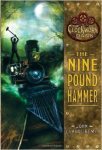 John Claude Bemis was the other author that I shared a table with at the Reception. I actually really want to read his Middle Grades The Clockwork Dark series, but I am afraid it might have too much in common with my yet-to-be-completed-and-published Menagerie series. Some day, after Gimmy has graduated from his circus train apprenticeship… Check out his The Nine Pound Hammer, The Prince Who Fell from the Sky, and others HERE.
John Claude Bemis was the other author that I shared a table with at the Reception. I actually really want to read his Middle Grades The Clockwork Dark series, but I am afraid it might have too much in common with my yet-to-be-completed-and-published Menagerie series. Some day, after Gimmy has graduated from his circus train apprenticeship… Check out his The Nine Pound Hammer, The Prince Who Fell from the Sky, and others HERE.
During the Celebrity Readings (deceptively names, I believe), I read a non-fiction, inspirational piece by self-help coach and author Felicia Jamison. Her book, Rain On Your Face, is about her emergence from an abusive relationship and encourages others in similar places.
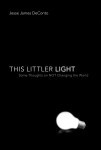 Jesse James De Conto was at the booth on our left. We have many two-degrees-from- connections around Durham, so I made a point of introducing myself to this jack-of-all-artistic-trades. He is a member of Pinkerton Raid, a community supporter extraordinaire, and–among other things–has written a book about his struggles and maturation in Christianity and life, This Littler Light. I fully intend to read it. Great cover, great excerpt.
Jesse James De Conto was at the booth on our left. We have many two-degrees-from- connections around Durham, so I made a point of introducing myself to this jack-of-all-artistic-trades. He is a member of Pinkerton Raid, a community supporter extraordinaire, and–among other things–has written a book about his struggles and maturation in Christianity and life, This Littler Light. I fully intend to read it. Great cover, great excerpt.
Lulu (the POD publisher/company) was at the booth on our right. At first, I was worried about this. I print with Createspace, which is basically the arch-nemesis of Lulu (and many other people and companies). But the guy there–after getting over the weirdness created when he spilled his coffee all over my booth (slight exaggeration)–was really knowledgeable (they have a staff of 85 and are located right there in Raleigh–I had no idea!) and really non-offensive and non-offended. We talked very casually about how as an indie publisher I check out Lulu and the other major POD printers about once a year, and how I would not be making the switch to Lulu until–at the very least–they offer matte covers on their paperbacks. Impressed with the look of my covers, he said he would get on that. ;)
 For lunch, we had the option between three food trucks. I was town between the falafel plate from Halal Haven and the spicy Korean pork from BO’s Kitchen, but finally decided on the pork with kimchi. So good! Kevin was a little put off by the un-modern-American trimming of the meat (he likes his super pretty), but I was really happy with my giant paper bowl of rice, veggies, meat, and pickle.
For lunch, we had the option between three food trucks. I was town between the falafel plate from Halal Haven and the spicy Korean pork from BO’s Kitchen, but finally decided on the pork with kimchi. So good! Kevin was a little put off by the un-modern-American trimming of the meat (he likes his super pretty), but I was really happy with my giant paper bowl of rice, veggies, meat, and pickle.
Ja y Pierce, author of the cookbook, Shrimp., read an excerpt from The Night of One Hundred Thieves for the Celebrity Readings segment. The idea was cross-genre author and content, and I think they paired us well, since my excerpt–although fantasy fiction–was chock-full of “burnished foul” and “heaps of rolls” and “tapped mead.” His book is part of the Savor the South series by UNC’s press.
y Pierce, author of the cookbook, Shrimp., read an excerpt from The Night of One Hundred Thieves for the Celebrity Readings segment. The idea was cross-genre author and content, and I think they paired us well, since my excerpt–although fantasy fiction–was chock-full of “burnished foul” and “heaps of rolls” and “tapped mead.” His book is part of the Savor the South series by UNC’s press.


May 26, 2015
Best Books: Young Adult, Middle Grades, and Children
Yes, I absolutely had to combine the three into one post. It was just too hard to find lists that accurately distinguished between children’s, middle grades, and young adult reads. In fact, there may be no accurately distinguishing between them. See post HERE to get an idea of what I mean. And on top of whatever I said in that post about having lots of gray area, people just read differently, and no less so when they are developing. So there will always be arguments about which category a book falls in to–YA, MG or Children’s–but the truth is, many authors don’t write for the category (or even predate the categories), so the book is what it is. Also, there is great variation in human development and maturity in any of these categories because, well, think of the difference between a first grader and fifth grader, or a thirteen-year-old and an eighteen-year-old.
I did, however, attempt to split them into the three categories, myself, anyways. I am sure there are some utter fails. And there are most definitely repeats between the lists, for (I think) obvious reasons. I did my best. Also, this seems to be the Best Books area where there are more arguments about what makes all these root lists. Ah well! I embraced all the major lists I found, so there are sure to be a dozen or so stinkers mixed in with the real gems.
This list, as well as all my Best Books lists, is a mish-mash of several best books lists from around and about. They are in no particular order. Please excuse spelling, style, and repeating mistakes. It takes a lot of time to pull these things together, and the object is to create just a starting point for our own adventures in reading (and reviewing). Middle Grades is the shortest list because most of the time readers here can go up or down based on their abilities and maturity (despite subject and tone differences. Oi). I also stuck to chapter books, only, meant for at least upper elementary; no picture books here.
We can all enjoy a great book, right? Even if it’s meant for a fourth grader or a sixteen-year-old.
NOTE: I am NOT recommending any of these books for your child of whatever particular age! I have read only a small fraction of them and I can not speak to their content unless I have already reviewed them HERE. *Please educate yourself on the books that your child will be reading (just like TV shows or movies), or read with them.* Books make great parent-child discussion starters.
For reviews of all books already read and reviewed for this blog, see HERE. For reading recommendations, including Children’s/MG/YA and many books that are not on the following list, see HERE.
CHILDREN’S:
The Wind in the Willows, Kenneth Grahame
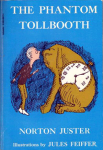
Where the Sidewalk Ends, Shel Silverstein
The Phantom Tollbooth, Norton Juster
Where the Mountain Meets the Moon, Grace Lin
The Secret Garden, Frances Hodgson Burnett
Zen Shorts, Jon J. Muth
Matilda, Roald Dahl
Sarah, Plain and Tall, Patricia Maclachlan
Maze of Bones (39 Clues series), Rick Riordan
Ivy + Bean (series), Annie Barrows
Tales of a Fourth Grade Nothing, Judy Blume
The Adventures of Captain Underpants (series), Dav Pilkey
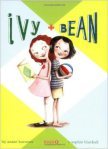
All-of-a-Kind Family, Sydney Taylor
The Arrival, Shaun Tan
Because of Winn-Dixie, Kate DiCamillo
The Birchbark House, Louise Erdrich
The Book of Three, Lloyd Alexander
The Borrowers, Mary Norton
Bridge to Terabithia, Katherine Paterson
Chains, Laurie Halse Anderson
D’Aulaire’s Book of Greek Myths, the D’Aulaires

Esperanza Rising, Pam Munoz Ryan
Frog and Toad Are Friends, Arnold Lobel
From the Mixed-Up Files of Mrs. Basil E. Frankweiler, E.L. Konigsburg
Harriet the Spy, Louise Fitzhugh
Locomotion, Jacqueline Woodson
Mrs. Frisby and the Rats of NIMH, Robert C. O’Brien
One Crazy Summer, Rita Williams-Garcia
The People Could Fly, Virginia Hamilton
Pierre, Maurice Sendak
Pippi Longstocking, Astrid Lindgren
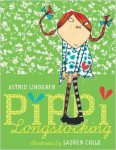
Ramona the Pest, Beverly Cleary
Starry River of the Sky, Grace Lin
The Stories Julian Tells, Ann Cameron
Tales of Uncle Remus, Julius Lester
The Watsons Go to Birmingham–1963, Christopher Paul Curtis
When You Reach Me, Rebecca Stead
A Wrinkle in Time, Madeleine L’Engle
The Giving Tree by Shel Silverstein
The Complete Tales of Winnie the Pooh, A. A. Milne
Amelia Bedelia, Peggy Parrish
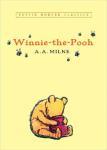
Charlotte’s Web, by E.B. White
The Lion, the Witch, and the Wardrobe, C. S. Lewis
Charlie and the Chocolate Factory, Roald Dahl
Shiloh, Phyllis Reynolds Naylor
The Secret Garden, Frances Hodgson Burnett
The Boxcar Children, Gertrude Chandler Warner
The Indian in the Cupboard, Lynne Reid Banks
Island of the Blue Dolphins, Scott O’Dell
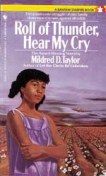
Maniac Magee, Jerry Spinelli
The BFG, Roald Dahl
James and the Giant Peach, Roald Dahl
Roll of Thunder, Hear My Cry, Mildred D. Taylor
Stone Fox, John Reynolds Gardiner
The Best Christmas Pageant Ever, Barbara Robinson
Tales of a Fourth Grade Nothing by Judy Blume
Ramona Quimby, Age 8, Beverly Cleary
The Trumpet of the Swan, E. B. White
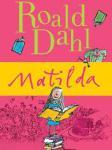
The Chronicles of Narnia (series), C. S. Lewis
The Great Gilly Hopkins, Katherine Paterson
Little House (series), Laura Ingalls Wilder
Sideways Stories from Wayside School, Louis Sachar
Harriet the Spy, Louise Fitzhugh
A Light in the Attic, Shel Silverstein
Mr. Popper’s Penguins by Richard Atwater
My Father’s Dragon, Ruth Stiles Gannett
Stuart Little, E. B. White
The Watsons Go to Birmingham-1963, Christopher Paul Curtis
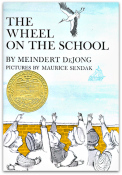
Beezus and Ramona, Beverly Cleary
The Wheel on the School, Meindert DeJong
Caddie Woodlawn, Carol Ryrie Brink
MIDDLE GRADES:
A Wrinkle In Time, Madeleine L’Engle
Harry Potter (series; first half), J.K. Rowling
The Diary of a Young Girl, Anne Frank
Anne of Green Gables , L.M. Montgomery
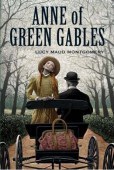
Tuck Everlasting, Natalie Babbitt
Bud, Not Buddy, Christopher Paul Curtis
The Giver, Lois Lowry
Are You There God? It’s Me, Margaret, Judy Blume
The Hunger Games, Suzanne Collins
Diary of a Wimpy Kid, Jeff Kinney
Chronicles of Narnia (series), C.S. Lewis
Hatchet, Gary Paulsen
The Lightning Thief, Rick Riordan
Through My Eyes, Ruby Bridges
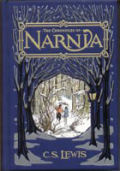
A Series of Unfortunate Events (series), Lemony Snickett
The Invention of Hugo Cabret, Brian Selznick
Esperanza Rising, Pam Munoz Ryan
Bridge to Terabithia, Katherine Paterson
Holes, Louis Sachar
Mrs. Frisby and the Rats of NIMH, Robert O’Brien
Rules, Cynthia Lord
A Single Shard, Linda Sue Park
A Joyful Noise: Poems for Two Voices, Paul Fleischman
Charlotte’s Web, E.B. White
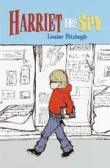
The Miraculous Journey of Edward Tulane, Kate De Camillo
Harriet the Spy, Lewis Fitzhugh
The Wind in the Willows, Kenneth Grahame
Mary Poppins, P.L. Travers
Percy Jackson (series), Rick Riordan
Frindle, Andrew Clements
Secret (series), Psuedonymous Bosch
The Yearling, Marjorie Kinnan Rawlings
The Giver, Lois Lowry
The Graveyard Book, Neil Gaiman
Hatchet, Gary Paulsen
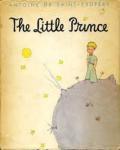
The Hobbit, J. R. R. Tolkein
The Little Prince, Antoine de Saint-Exupery
Roll of Thunder, Hear My Cry, Mildred D. Taylor
The Westing Game, Ellen Raskin
Number the Stars, Lois Lowry
Walk Two Moons, Sharon Creech
The Witch of Blackbird Pond, Elizabeth George Speare
Anastasia Krupnik, Lois Lowry
Danny the Champion of the World, Roald Dahl
I Am the Messenger, Markus Zusak
Miracle’s Boys, Jacqueline Woodson
Uglies, Scott Westerfield
Code Name Verity, Elizabeth Wein
(You) Set Me On Fire, Mariko Tamaki
The Raven Boys, Maggie Steifvater
Grasshopper Jungle, Drew Smith
The Catcher In the Rye, J. D. Salinger
Aristotle and Dante Discover the Secrets of the Universe, Benjamin Alire Saenz
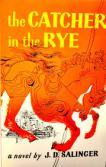
How I Live Now, Meg Rosoff
Where the Red Fern Grows, WIlson Rawls
The Hobbit, J.R.R. Tolkein
Summer of the Monkeys, Wilson Rawls
The Cat, Theodore Taylor
The Sign of the Beaver, Elizabeth George Speare
Harry Potter (series), J. K. Rowling
The Hunger Games (trilogy), Suzanne Collins
To Kill a Mockingbird, Harper Lee

The Fault In Our Stars , John Green
The Catcher in the Rye, J. D. Salinger
The Lord of the Rings (trilogy), J.R.R. Tolkein
Farenheit 451, Ray Bradbury
Looking for Alaska, John Green
The Book Thief, Markus Zusak
The Giver (series), Lois Lowry
The Hitchhiker’s Guide to the Galaxy (series), Douglas Adams
The Outsiders, S. E. Hinton
Anne of Green Gables , L. M. Montgomery
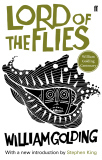
His Dark Materials (series), Philip Pullman
The Perks of Being a Wallflower, Stephen Chbosky
The Princess Bride, William Goldman
Lord of the Flies, William Golding
Divergent (series), Veronica Roth
Paper Towns, John Green
The Mortal Instruments (series), Cassandra Clare
An Abundance of Katherines, John Green
Flowers for Algernon, Daniel Keyes
Thirteen Reasons Why, Jay Asher

The Curious Incident of the Dog in the Night-Time, Mark Haddon
Speak, Laurie Halse Anderson
Twilight (series), Stephanie Meyer
Infernal Devices (series), Cassandra Clare
Tuck Everlasting, Natalie Babbitt
The Absolutely True Diary of a Part-Time Indian, Sherman Alexie
The Sisterhood of the Traveling Pants, Ann Brashares
The Call of the Wild, Jack London
Will Grayson, Will Grayson, John Green

Go Ask Alice, Anonymous
Howl’s Moving Castle, Diana Wynne Jones
Stargirl, Jerry Spinelli
A Separate Peace, John Knowles
Vampire Academy (series), Richelle Mead
Abhorsen (trilogy), Garth Nix
Dune, Frank Herbert
Discworld/Tiffany Aching (series), Terry Pratchett
My Sister’s Keeper, Jodi Picoult
The Dark is Rising (sequence), Susan Cooper
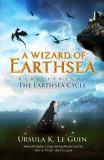
Graceling (series), Kristin Cashore
Forever…, Judy Bloom
Easrthsea (series), Ursula K. Le Guin
Inheritance (cycle), Christopher Paolini
The Princess Diaries (series), Meg Cabot
Song of the Lioness (series), Tamora Pierce
Treasure Island, Robert Louis Stevenson
Delirium (series), Lauren Oliver
Anna and the French Kiss, Stephanie Perkins
Hush, Hush (saga), Becca Fitzpatrick
13 Little Blue Envelopes, Maureen Johnson

It’s Kind of a Funny Story, Ned Vizzini
A Great and Terrible Beauty, Libba Bray
Miss Peregrine’s Home for Peculiar Children, Ransom Riggs
The House on Mango Street, Sandra Cisneros
Something Wicked This Way Comes, Ray Bradbury
The Chocolate War, Robert Cormier
Just Listen, Sarah Dessen
A Ring of Endless Light, Madeleine L-Engle
The Truth About Forever, Sarah Dessen
Bratimaeus (trilogy), Jonathan Stroud

Bloodlines (series), Richelle Mead
Fallen (series), Lauren Kate
House of Night (series), P.C. Cast
Capture the Castle, Dodie Smith
Nick and Nora’s Infinite Playlist, Rachel Cohn
Before I Fall, Lauren Oliver
Unwind, Neal Shusterman
The Last Unicorn, Peter S. Beagle
The Maze Runner (series), James Dashner
If I Stay, Gayle Forman
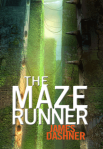
The Blue Sword, Robin McKinley
Crank, Ellen Hopkins
Matched (series), Ally Condie
Gallagher Girls (series), Ally Carter
The Goose Girl, Shannon Hale
Daughter of the Lioness/Tricksters (series), Tamora Pierce
I Am the Messenger, Markus Zusak
The Immortals (series), Tamora Pierce
The Enchanted Forest Chronicles, Patricia C. Wrede
Chaos Walking (series), Patrick Ness
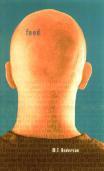
Circle of Magic (series), Tamora Pierce
Daughter of Smoke & Bone, Laini Taylor
Feed, M.T. Anderson
Weetzie Bat (series), Francesca Lia Block
Along for the Ride, Sarah Dessen
Confessions of Georgia Nicholson (series), Louise Rennison
Leviathan (series), Scott Westerfield
The House of the Scorpion, Nancy Farmer
The Chronicles of Chrestomanci, Diana Wynne Jones
This Lullaby, Sarah Dessen
Gone (series), Michael Grant
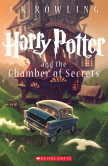
Shiver (trilogy), Maggie Stiefvater
The Hero and the Crown, Robin McKinley
Wintergirls, Laurie Halse Anderson
Betsy-Tacy (books), Maud Hart Lovelace
Are You There God? It’s Me, Margaret, Judy Blume
Roll of Thunder, Hear My Cry, Mildred E. Taylor
Chronicles of Narnia (series), C.S. Lewis
Monster, Walter Dean Myers
The Golden Compass, Philip Pullman
The Diary of a Young Girl, Anne Frank
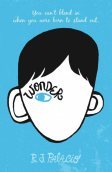
Looking for Alaska, John Green
Wonder, R.J. Palacio
The Sword in the Stone, T.H. White
Little Women, Louisa May Alcott
The Adventures of Huckleberry Finn, Mark Twain
The Wonderful World of Oz, L. Frank Baum
Alice’s Adventures in Wonderland, Lewis Carroll
The Chocolate War, Robert Cormier
Jacob Have I Loved, Katherine Paterson
Hatchet, Gary Paulsen
The Alchemyst, Michael Scott
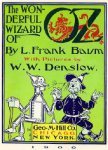
Tarzan of the Apes, Edgar R. Burroughs
Johnny Tremain, Esther Forbes
A Northern Light, Jennifer Donnelly
For Freedom, Kimberly Brubaker Bradley
The Wall, Peter Cis
A Monster Calls, Patrick Ness
The Illustrated Man, Ray Bradbury
A Wreath for Emmett Till, Marilyn Nelson
Every Day, David Levithan
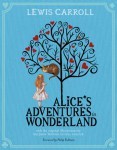
Where Things Come Back, John Corey Whaley
Number the Stars, Lois Lowry
Blankets, Craig Thompson
Private Peaceful, Michael Morpurgo
The Witch of Blackbird Pond, Elizabeth George Speare
Boxers and Saints, Gene Luan Yang
City of the Beasts, Isabel Allende
American Born Chinese, Gene Luen Yang
The Lost Conspiracy, Frances Hardinge

The Pigman, Paul Zindel
The Knife of Never Letting Go, Patrick Ness
Boyproof, Cecil Castellucci
Fallen Angels, Walter Dean Myers
A High Wind in Jamaica, Richard Hughes
The Tiger Rising, Kate DiCamillo
The Grey King, Susan Cooper
The Thief Lord, Cornelia Funke
The Mysterious Benedict Society, Trenton Lee Stewart
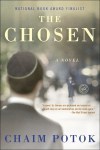
The Invention of Hugo Cabret, Brian Selznick
Sabriel, Garth Nix
Tiger Lilly, Jodi Lynn Anderson
Tales of Mystery and Imagination, Edgar Allen Poe
Whale Talk, Chris Crutcher
The Chosen, Chaim Potok
Ender’s Game , Orson Scott
Ender’s Shadow, Orson Scott Card
Shade’s Children, Gareth Nix
The Song of the Lioness, Tamora Pierce
So Yesterday, Scott Westerfield
Eleanor and Park, Rainbow Rowell
Dogsbody, Dianna Wynne Jones
Alabama Moon, Watt Key
Saffy’s Angel, Hilary McKay
The Chronicles of Prydain (series), Lloyd Alexander


May 22, 2015
Best Books: Sci-Fi/Fantasy
I have recently joined a science fiction/fantasy writers group in the area. I thought that since my first novel was magic realism, the second was fantasy, and the third will also be fantasy, it would behoove me to get a little more into the culture, to learn from it and to basically not be totally ignorant. In the course of my reading life, so far, I have not been a science fiction or fantasy reader for very long. (Actually, I would still not consider myself a science fiction reader.) It was only when my very little daughter got into The Chronicles of Narnia years ago that I started pursuing children’s fantasy, then MG/YA, then grown-up. I still read other genres, but I have come to appreciate fantasy immensely, which was bound to happen because I basically lived in a sci-fi/fantasy novel in my head my whole life.
At a neighborhood yard sale a couple weekends back, I was rummaging through a box of books and came across a copy of Christopher Paolini’s Eragon. For next-to-nothing, I picked it up because it was a title I was familiar with so I assumed it must be pretty popular. I also needed a brief break from reading every word the Bronte sisters ever put on the page. As for Eragon, I am enjoying it and I am learning from it, but it is–as any quick online search will tell you–not without its faults. However, part of what I am getting from it is a sort of flash-read of the epic fantasy traditions. It has made me wonder how much I know about fantasy and how much I actually want to know before writing my own. On one hand, I don’t want to make incredible blunders just because I didn’t know the field well enough. On the other, knowing less might help me keep my own voice and write more original stuff.
By the way, I was pleasantly surprised that I have read a number of these books, I just didn’t think of them as genre fiction when I read them. The Once and Future King and Till We Have Faces (not on the list, but it should be; not to mention the Harry Potter series) are two of my favorite books. I loved A Wrinkle In Time when I was a kid, and I have read such titles as Wicked, The Time-Traveler’s Wife, and Little, Big as well as the school requirements 1984, Brave New World, and Fahrenheit 451.
At any rate, I decided that in honor of a new love and of a new writing group, I would post the Best Books list for sci-fi and fantasy. (For previous Best Books lists, see HERE.) The list was generated by combining several online lists and results are listed in no particular order. Except that I grouped it: science fiction, then fantasy, then I-don’t-know-which-one-this-is-but-I-wasn’t-about-to-spend-an-hour-of-my-morning-finding-out. Please excuse my having italicized things that shouldn’t be; it was hard to determine which were series names and which were titles, in some cases. I’ll get there.
Science Fiction
Dune, Frank Herbert
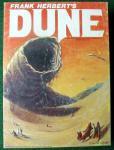
Ender’s Game, Orson Scott Card
The Thought Readers, Dima Zale
Foundation, Isaac Asimov
The Stars My Destination, Alfred Bester
2001: A Space Odyssey, Arthur C. Clarke
Hyperion Cantos, Dan Simmons
Neuromancer, William Gibson
1984, George Orwell
The Hitchhiker’s Guide to the Galaxy, Douglas Adams
Ubik, Philip K. Dick
The Forever War, Joe Haldman
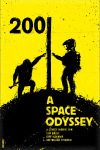
Snow Crash, Neil Stephenson
A Fire Upon the Deep, Vernor Vinge
Old Man’s War, John Scalzi
Alfred Carbon, Richard Morgan
Book of the New Sun, Gene Wolfe
Player of Games, Iain M. Banks
The Night’s Dawn, Peter F. Hamilton
Gateway, Frederick Pohl
Spin, Robert Charles Wilson
The Windup Girl, Paolo Bacigalupi
Anathem, Neal Stephenson

Blindsight, Peter Watts
Miles Vorkosigan, Lois McMaster Bujold
Slaughter-House Five, Kurt Vonnegut Jr.
The Martian Chronicles, Ray Bradbury
Brave New World, Aldous Huxley
Fahrenheit 451, Ray Bradbury
I, Robot, Isaac Asimov
Do Androids Dream of Electric Sheep?, Phillip K. Dick
The Stand, Stephen King
Cat’s Cradle, Kurt Vonnegut
Starship Troopers, Robert Heinlein

The Moon is a Harsh Mistress, Robert Heinlein
The Time Machine, H. G. Wells
Flowers for Algernon, Daniel Keyes
The War of the Worlds, H. G. Wells
Amber, Roger Zelazny
Ringworld, Larry Niven
Contact, Carl Sagan
World War Z, Max Brooks
Vorkosigan, Lois McMaster Bujold
The Road, Cormac McCarthy
The Time Traveler’s Wife, Audrey Niffenegger

Old Man’s War, John Scalzi
Diamond Age, Neil Stephenson
Culture, Iain M. Banks
Thrawn trilogy, Timothy Zahn
Red Mars, Kim Stanley Robinson
Space trilogy, C. S. Lewis
The Stars My Destination, Alfred Bester
The Time Machine, H. G. Wells
How to Live Safely In the Science Fictional Universe, Charles Yu
Fantasy
20,000 Leagues Under the Sea, Jules Verne
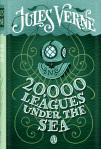
Lord of the Rings, J. R. R. Tolkein
A Game of Thrones, George R. R. Martin
Harry Potter, J. K. Rowling
The Hunger Games, Suzanne Collins
The Name of the Wind, Patrick Rothfuss
The Blade Itself, Joe Abercrombie
Mythborn, V. Lakshman
The Magicians, Lev Grossman
Discworld, Terry Pratchett
Les of Locke Lamora, Scott Lynch
The Way of Kinds, Brandon Sanderson
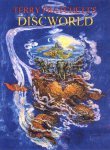
Assassin’s Apprentice, Robin Hobb
Gardens of the Moon, Steven Erikson
American Gods, Neil Gaiman
A Wizard of Earthsea series, Ursula K. Le Guin
Jonathan Strange and Mr. Norrell, Susanna Clarke
The Black Company, Glen Cook
Heroes Die, Matthew Woodring Stover
The Prince of Thorns, Mark Lawrence
Under Heaven, Guy Gavriel Kay
City of Stairs, Robert Jackson Bennett

The Nightwatch, Sergei Lukyanenko
Fafhrd and the Grey Mouser, Fritz Leibr
Black Sun Rising, C. S. Friedman
The Night Circus, Erin Morgenstern
Legend, David Gemmell
The Dark Tower, Stephen King
The Dresden Files, Jim Butcher
The Princess Bride, William Goldman
The Wheel of Time, Robert Jordan
The Handmaid’s Tale, Margaret Atwood
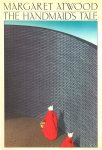
Dragonflight, Anne McCaffrey
Pawn of Prophecy, David Eddings
The Mists of Avalon, Marion Zimmer Bradley
Mistborn, Brandon Sanderson
The Simarlion, J. R. R. Tolkein
The Once and Future King, T. H. White
The Last Unicorn, Peter S. Beagle
Chronicles of Narnia, C. S. Lewis
A Wrinkle in Time, Madeleine L’Engle
Wizards’ First Rule, Terry Goodkind
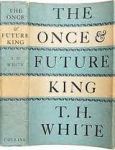
Riftwar, Raymond E. Feist
Sword of Shannara, Terry Brooks
Conan the Barbarian, Robert L. Howard
Assassin’s Apprentice, Robin Hobb
The Way of Kings, Brandon Sanderson
The Legend of Dritz, Salvatore
Wicked. Gregory Maguire
The Crystal Cave, Mary Stewart
Furies of Calderon, James Butcher
Shadow & Claw, Gene Wolfe
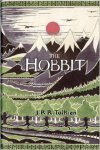
A Spell for Chameleon, Piers Anthony
Liveship Traders, Robin Hobb
Windhaven, George R. R. Martin
The Hobbit, J. R. R. Tolkein
Tigana, Guy Gavriel Kay
Bartameus trilogy, Jonathan Stroud
Thursday Next, Jasper Fforde
The Graveyard Book, Neil Gaiman
Farseer trilogy, Robin Hobb
Song of Ice and Fire, George R. R. Martin
Duncton Chronicles, William Horwood
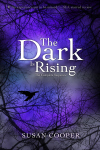
Inheritance trilogy, N. K. Jemisin
Shadowmarch quartet, Tad Williams
Ryhope Wood, Robert Holdstock
A Christmas Carol, Charles Dickens
Dark Is Rising, Susan Cooper
The Anubis Gates, Tim Powers
Chronicles of Thomas Covenant the Unbeliever, Stephen Donaldson
The Picture of Dorian Grey, Oscar Wilde
Edge Chronicles, Paul Stewart
Chronicles of the Black Company, Glen Cook
Dracula, Bram Stoker
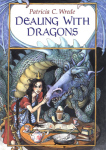
The Color of Magic, Terry Pratchett
Alice’s Adventures in Wonderland, Lewis Carroll
Dealing with Dragons, Patricia C. Wrede
Howl’s Moving Castle, Dianna Wynne Jones
I Honestly Don’t Know
Dhalgren, Samuel R. Delaney
War of the Worlds, H. G. Wells
Stranger in a Strange Land, Robert Heinlein
Dangerous Visions, Harlan Ellison

Childhood’s End, Arthur C. Clarke
Ringworld, Larry Niven
The Left Hand of Darkness, Ursula K. Le Guin
Kindred, Octavia Butler
Animal Farm, George Orwell
Watchmen, Allan Moore
Frankenstein, Mary Shelley
The Sandman series, Neil Gaiman
A Clockwork Orange, Anthony Burgess
Watership Down, Richard Adams
A Canticle for Leibowitz, Walter M. Miller
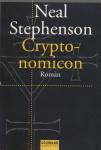
Neverwhere, Neil Gaiman
Childhood’s End, Arthur C. Clarke
Hyperion, Dan Simmons
Stardust, Neil Gaiman
Cryptonomicon, Neal Stephenson
The Forever War, Joe Holdeman
Small Gods, Terry Pratchett
Going Postal, Terry Pratchett
The Mote In God’s Eye, Larry Niven
I Am Legend, Richard Mattheson
A Journey To the Center of the Earth, Jules Verne
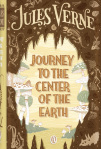
Rendezvous with Rama, Arthur C. Clarke
Cushiel’s Dart, Jacqueline Carey
The Dispossessed, Ursula K. Le Guin
Something Wicked This Way Comes, Ray Bradbury
The Eyre Affair, Jasper Ford
Outlander, Diana Gabaldon
The Illustrated Man, Ray Bradbury
Sunshine, Robin McKinley
The Fire Upon Deep, Vernor Vinge
The Caves of Steel, Isaac Asimov

Lucifer’s Hammer, Larry Niven
Doomsday Book, Connie Willis
Perdido Street Station, China Meiville
Gormenghast, Mervyn Peake
Kindred, Octavia E. Butler
Nine Princes In Amber, Roger Zelazny
The City & the City, China Meiville
Zone One, Colson Whitehead
His Dark Materials, Philip Pullman
The Female Man, Joanna Russ
Browngirl in the Ring, Nalo Hopkinson

Solaris, Stanislov Lem
Among Others, Jo Walton
The Drowned World, J. G. Ballard
Witch World, Andre Norton
Never Let Go, Kazuo Ishiguro
Little, Big, John Crowley
The Giver, Lois Lowry


May 14, 2015
Series Review: The Secret Series
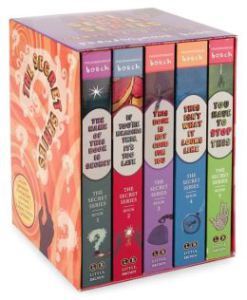 The middle grades Secret Series by Psuedonymous Bosch: The Name of This Book is Secret (2008); If You’re Reading This, It’s Too Late (2009); This Book is Not Good for You (2010); This Isn’t What It Looks Like (2011); and You Have to Stop This (2012), in order. Illustrated by Gilbert Ford. Published by Little, Brown. We bought this popular series in a set, otherwise we probably would have stopped reading after the first one. As it was, I read it out loud to my kids and it took us several months. There is a new series, The Bad Books series, which just began with Bad Magic and is about one of the main characters from The Secret Series’s younger brothers when he is older. They are not completely connected; more like a spin-off.
The middle grades Secret Series by Psuedonymous Bosch: The Name of This Book is Secret (2008); If You’re Reading This, It’s Too Late (2009); This Book is Not Good for You (2010); This Isn’t What It Looks Like (2011); and You Have to Stop This (2012), in order. Illustrated by Gilbert Ford. Published by Little, Brown. We bought this popular series in a set, otherwise we probably would have stopped reading after the first one. As it was, I read it out loud to my kids and it took us several months. There is a new series, The Bad Books series, which just began with Bad Magic and is about one of the main characters from The Secret Series’s younger brothers when he is older. They are not completely connected; more like a spin-off.
I was surprised that in the end, the kids and I wanted to know what happened. In fact, most nights they were all like, “Read to us!” But then they didn’t pay the best of attention. I don’t know how much of this had to do with the particular series. Most of the time, we were (all) slightly bored (as opposed to when we read The Chronicles of Narnia).
The author obviously goes by a pseudonym, like Lemony Snicket, and it is widely accepted that he is Raphael Simon. The pseudonym is not only a clever one, but it fits the whole idea of the series: that he is a participant in the story revealing the details of a top secret organization through the use of fake names and false places, and that because of his revelations, his life (and ours!) is in danger.
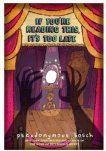

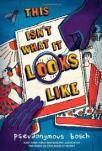
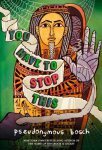
I’m going to generously start with the best part about this series: the idea. What I shared above: that this is a secret person revealing the secrets of a secret society and putting everyone’s lives in danger… great idea! Love it! And Bosch really carries the idea through every single book, bringing the reader back to the “reality” behind the story over and over and in such clever ways. And with the new addition of Write This Book, he loops the reader in even more. (We have not read/written that one, but I think it’s super clever, especially as related to the series.)
The other best part of this series: the extras. It’s not just a novel. There are many footnotes (which are not great for read-aloud, but otherwise…), asides, blanked-out information, codes, illustrations, a few forms, nontraditional pages, and (except for in book 5) long, interactive appendices. Again, this all works especially well with the idea of the series and how strong the narrator is a part of the experience, himself. Plus, this is where the humor comes in. And plenty of actual education with the humor.
But here’s where it all starts to head south. While the cover illustrations are eye-catching and acceptable, the illustrations inside are terrible. Perhaps you would argue that it’s some sort of style, but even my kids would often look at the drawings out of the corners of their eyes, as if to say, “Mom, I draw hands better than that!” It was not uncommon for one of us to ask, “Is that supposed to be Cass?” or even, “What is that supposed to be?”
Let’s just come right out and say that the writing is so-so. There are definitely glimmers of imagination, but the actual writing has moments of real stink and long swaths of mediocrity. Let me drag Rowling into this for the first of three times in this review: Harry Potter is also only so-so in the writing department. But Harry Potter has amazing characters and impeccable plotting. I can not say that for The Secret Series, and you will see what I mean, below.
We’ll just keep wading into my complaints, then. Because, despite the popularity of the series and the great reviews, I just can not say I enjoyed these books, and neither can my ten- or seven-year-old. Let’s start with fact that Bosch picked the hardest names ever to read (aloud or in your head). It gets super annoying to always be reading “Cass asked” this and “Cass asked” that, and oh-my-goodness Max-Ernest couldn’t have a nickname? And how many times do you want to say Yo-Yogi in one conversation? Try maybe once.
So maybe that’s a nit-picky thing, but this is standard: Bosch loves those adverbs a LOT too much. Now, I can take some adverbs–unlike some writing and reading snobs–when they are well-placed and sorta rare. But I got so irritated with the repetition of sentence structure coupled with unnecessary adverbs that I read a page out to my husband after the kids were in bed and I was practically in tears over the state of popular fiction. (Sorry, I don’t know where it is anymore but I think it was in book four). For two pages, almost every paragraph was “Whatever, something, yadda yadda” whomever spoke/said/asked/yelled blah-blah-blah-ly. In the words of Stephen King, “While to write adverbs is human, to write ‘he said’ or ‘she said’ is divine.” Thank you!
In fact, I just opened the last book up to a random page to find some inspiration for the review, and that one random page included this gem (sarcasm) of a conversation:
“‘…It’s not for sale!’ said Grandpa Larry automatically.
“‘Then what’s it doing here?” the customer asked angrily.
“‘Fine, twist my arm, five dollars,’ said Grandpa Larry grumpily.”
And tacked on later, just for kicks:
“‘Well, I didn’t know you were moving!’ said Cass accusatorially.”
(which is not even a word).
And as a reader, I am forever noticing writers’ pet words. One of Rowling’s is “pant.” I recently read a book where everything was “superfluous.” I have these words, myself. One of them is “gaze.” If my characters would just quit gazing here and gazing there and gazing everywhere! Unfortunately, Bosch’s pet words are like ten-dollar words that become obnoxious because they are so obvious. But once again, I find myself being a bit nit-picky. Here’s something a little more substantial: Bosch falls pray to the over-realistic conversation. What I mean is, readers don’t really want to know every time a character hesitates, stutters, or “um”s. It’s tempting to write that way, I know, but it, too, is obnoxious.
And what the heck is up with Max-Ernest’s family?!? It’s sort of interesting even while it’s seriously uncomfortable, but why they heck bring them together and then rip them apart again!? Weirdest plot decision ever.
I am going to guess that part of what happened to this series is what happens to plenty of series. I bet that Bosch wrote the first book with the rest of the series in his head, but that his publisher hung some deadlines over him. Therefore each subsequent book got less-seriously edited and was rushed to press. Around the third book in a series like this, you start to see ever-more glaring typos at an alarming rate. It’s sad. Plot pieces start to unravel. You wind up with scenes where you are unclear if a character has left or what the new guy’s name is, and then you spot some contradictory information. It’s just a matter of rushed editing and it happens all the time. It even happened with Harry Potter (and there’s the third and final mention).
Honestly, though, Bosch never does a great job with characters. It’s like he has great ideas, but he doesn’t have that natural ability to make a reader love a character or to ease into them without much work. I can’t say the kids or I cared about a single character by the end of the series. In fact, I was more interested in a few of the villains, and we didn’t really see that much of them. I found Cass, Max-Ernest, and Yo-Yogi to be basically flat. Sorry, but I am a character writer and a character reader, so this is a big deal for me.
The plot, on the other hand, is okay. You get it. The senses thing might be a bit unnecessary, but something’s always happening and it has something to do with friendship, the pre-teen years, or the Terces Society and their nemeses the Midnight Sun. Then again, I didn’t find the plot to flow very well, especially in the over-arching department. Specifically, the plot doesn’t ratchet up over time or build toward one big crescendo. It’s like a number of small denouements, which, I bet you can guess, is not tremendously fulfilling.
And while we are on the topic, the ending pretty much sucked. I won’t include any spoilers, but the Big Secret–the whole crux of the series–is super anti-climactic. If you can even figure out what it is. Because, honestly, my kids were like, “What, Mom?” And you know, the whole time you’re reading, that the revelation of the Secret better be darn near perfect, and the Secret itself, amazing. But… that never happened. The bad guys never really got what was coming to them. There was no final confrontation. And in trying to cleverly not wrap anything up cuz that’s like real life, Bosch really didn’t wrap up anything.
The moral of this review? Your kids might want to read it because every one else is reading it. It wouldn’t be the worst thing for them to read. They might get a kick out of parts of it. But I can’t justify recommending the series to anyone, young or old. It’s a great idea that just falls flat in a number of ways. It’s not awful, it’s just not great, wrote Devon emphatically.


May 11, 2015
Book Reviews: Dave Ramsey
The Total Money Makeover (2003, Thomas Nelson) and Complete Guide to Money (2011, Lampo Press), both by Dave Ramsey, the Financial Peace money guru.
Let’s just do this up front: you either love the Dave Ramsey system or you hate it. You either jump in with both feet and hang on for dear life, or you go in half-hog and never make it. It’s an all or nothing proposition, because it is a financial system. Also, let’s be clear: Financial Peace is a Christian financial system. This does not mean you have to be a Christian to adopt it; the financial bit will work either way. But it does mean that you are going to come across Christian apologetics and worldview, occasionally.
And now I’ll tell you how I ended up sliding this book into my reading list. A couple reasons: one, Dave Ramsey’s financial books are easily listed in both the best religious books and most influential books of our time. Millions of Americans ascribe to his financial system, listen to his radio show, take his courses, and read his books, and many of them claim that it has changed their lives. So these books are legitimate additions. The other reason, though, is that my husband signed us up for a Dave Ramsey class, Financial Peace University, so I was required to read Complete Guide to Money. The Total Money Makeover I had already read, before I started writing reviews for The Starving Artist, and it is listed HERE on my best self-help books list.
So here we are. The class is over. The books have been read. And disclaimer: the Flahertys have deepened our love of and commitment to the Dave Ramsey financial system. If you must know, we are on the band wagon and there we will stay. This is counter-culture, life-changing stuff. I’m a smart person and I agree with the whole shebang. But let’s see if we can’t get a regular ol’ book review out of this.
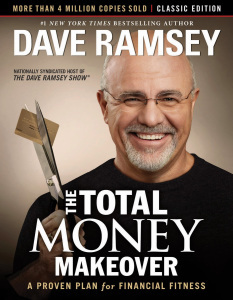 The Total Money Makeover is a book that I read years ago, and is meant to be read by an individual (or a couple) to give them the complete Ramsey system without taking a class. Of course, the individual could benefit from The Total Money Makeover Workbook and is also encouraged to take a class (which has a pretty minimal fee and includes lifetime membership).
The Total Money Makeover is a book that I read years ago, and is meant to be read by an individual (or a couple) to give them the complete Ramsey system without taking a class. Of course, the individual could benefit from The Total Money Makeover Workbook and is also encouraged to take a class (which has a pretty minimal fee and includes lifetime membership).
Right from the beginning, Ramsey says that this book is not new information and it is not complicated; it is just a system for doing what your “grandma” did with her finances. Ramsey, the man, was a real estate broker who did all the normal things and ended up bankrupt and financially crushed in his late twenties. Then, he started asking why all his finance professors had been broke and came to a lot of counter-culture conclusions (which incidentally were not counter-culture just a few generations ago) which he turned into a teachable system, and eventually an empire.
The system is based on Seven Steps (which he calls “Baby Steps” and I find to be a misnomer). You do the Seven Steps, completely and in order, and you get out of whatever financial pickle you may or may not be in, no matter how old you are or how much money you make. The book is set up to first lay some concept groundwork, then de-bunk myths about debt and wealth, then walk you through the Steps in detail. I do find myself wondering about people in poverty, of course, and also about people who are just slammed by life. But I have no experience to back me up in this, and Ramsey supposedly does. He says it works every time.
I am the person he refers to in Complete Guide to Money: “Every time I teach on investing, I can immediately spot the… Free Spirits in the room …. They go to their happy places. I can see [them] start to float out of their bodies. Their eyes glaze over, and all of a sudden, they are running through a wheat field or singing in the rain in their minds. They just totally check out” (p196-197). As an artistic type with ADHD, that’s how I feel about finances. But these books are actually written well enough that I only occasionally skip around. Ramsey as an author (and speaker) is interesting and he keeps it fast-paced and simple enough that I actually find it pleasurable to read. There is a lot of new and fascinating information in there, and Ramsey makes sure to throw in stories and personal anecdotes. And if you’re buying in to it, you feel a real sense of urgency, hope, and excitement. That’s not an easy task to accomplish as an author, but it is perhaps one of the main reasons Ramsey has been successful where others have not. Sometimes I groaned at a joke or a phrase or whatnot. It’s true. But mostly the whole thing went down like the proverbial spoonful of sugar and my pen was flying over the page taking notes and making stars and arrows.
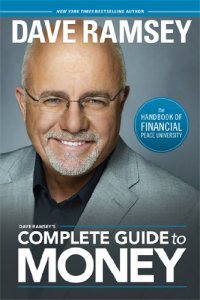 As for Complete Guide to Money, let me first say two things: 1) There is no reason why you would need to read both these books. They cover the same ground, basically. 2) This one is meant to be used in conjunction with the class. You could read it on your own (best with the package including the workbook, chart, CDs, etc.), but officially it is the companion book for Financial Peace University.
As for Complete Guide to Money, let me first say two things: 1) There is no reason why you would need to read both these books. They cover the same ground, basically. 2) This one is meant to be used in conjunction with the class. You could read it on your own (best with the package including the workbook, chart, CDs, etc.), but officially it is the companion book for Financial Peace University.
And I would basically give it the same review. It is well-enough written to keep you engaged and it is concise and fast-paced enough to finish it. The information can be life-changing, it can be hopeful and empowering. At the very least, you should feel more in charge of your financial destiny just by having more information. (Of course, there are plenty of people who would say it is misinformation, and just as many who would disagree with them emphatically, back.)
Having read this book along with the nine week class, I found the classroom experience to be both great and terrible. First of all, the in-class videos are almost exactly the same as the reading material. I had a college professor who used to do this, too, and it drove me crazy then and now. I suppose the repetition is helpful for some people, but to me it feels like a waste of time. Second, going through this controversial material with others is, as I said, both great and terrible. One moment, you watch as people get frustrated or reach mental blocks and get picked off. It totally happens because, let’s face it, this stuff is not for the faint of heart or the lazy or the not-so-sure. But then another moment, I realize that I have found a lot of financial peace from the Ramsey system, just in knowing more about money and being able to put my finger on all our money and financial stuff. If you have a plan and you understand your basic finances, that is much more peaceful than being clueless, in denial, or fearful. And we’re not even half-way through the steps, yet.
I would like to complain about the organization, though, meaning the organization of the books, workbook, and printable charts. It just fell short for me. I kept finding things did not seem as clear as they could or should, and things were missing that I wanted, or included when I thought they were unhelpful. For example, I really needed Ramsey to bold, underline, and highlight the action points. I didn’t need to do a half-way budget a week before completing the whole budget. What good is an incomplete budget? The books clearly try to be straight-forward, complete, and practical, but I think they could have been better in this way. So there was that. You just need to get organized for yourself. I also really think that once you have gotten used to the given budget forms, you need to make your own personalized one. You need to.
I also disagree with Ramsey occasionally, but that won’t stop me from following the complete system. For example, I do think obedience can be at least part of our motivation. I also think that he gets a little sentimental about all of us getting jobs that we love and are great at. But that’s just me; Midwestern to the core. For every opinion that I vary with Ramsey on, there are reservations that I had with him at the beginning which I just plain don’t have anymore, because I changed.
Over all, though, I clearly recommend these books. Finances are the kind of thing that–no matter how you might drag your feet–you do need to understand and to take control of. These books are New York Times best-selling, and millions of people have jumped on the band-wagon, so they are certainly worth checking out. I don’t know what it’s like to read them and decide either to dismiss them or go half-way with them. I assume that experience is not awesome. But I thought they were well worth reading, interesting enough, painless information, and even, I believe, potentially one of the most important books you will ever read.
_______________
Ramsey’s other books include:
Life Lessons with Junior
Financial Peace for the Next Generation
More Than Enough
Smart Money, Smart Kids
The Legacy Journey
EntreLeadership
Financial Peace Revisited
The Money Answer Book
_______________
And here is the one thing that is not in his books but that I really wish was; a complete list of the steps, in order, to financial freedom. This list will vary slightly depending on where you start (like if you own a home or or not, if you are single or have kids, etc.), but this is a great place to start. Add your own notes as you read the book.
Begin 10% tithe to home church
Vow to never borrow another penny again
Vow to never loan money, only give
Get an accountability partner
Start Budget Meetings, weekly and/or monthly
Start Zero-based Budget
Start Envelope System
Cut up those credit cards
Get rid of the car payments
Check Credit Report once/year
Okay all significant purchases from now on
Wait overnight for big purchases from now on
Don’t buy what you don’t understand from now on
Stop Retirement Contributions (this is temporary)
Step 1: Get $1000 in a savings account, for emergencies only
Put a cushion in your checking account – $250
Look into HSA and Health Insurance, and get with the program
Update Life Insurance NOW: term, 10x income or 10x childcare
Get will done!
Check Homeowner’s and Car insurance: $1000 deductible and liability >=$500,000
Get Occupational Disability Insurance for couple years coverage
Get Long-Term Disability Insurance from workplace and trade org., 60-65%
Get Identity Theft Protection for restoration services
Talk to your parents about their Long Term Care Insurance
Make a Legacy Drawer
Start your kids in financial education and peace
Start needed expenses Sinking Fund
Step 2: Do the Debt Snowball (to get out of debt!)
Step 3: Save 3-6 months income Emergency Fund in money markets
Cancel Short-Term Disability Insurance
PINNACLE POINT! (The point at which this starts being more fun)
Step 4: Invest 15% gross in Retirement with mutual funds. 1) 401K with company up to match, 2) Roth IRA up to max per person, 3) 401K/Company plan up to 15%
Step 5: Do your kids’ College Funding – max out ESAs
Start wants Sinking Fund
CRUCIAL POINT! (The point at which you don’t want to buckle so close to the finish line)
Step 6: Pay off Mortgage
Consider Real Estate (see p.300 or pay cash)
Step 7: Build Wealth and Give! (Mutual funds: 25% growth, 25% growth and income, 25% aggressive growth, 25% international, >5 yrs old, avg 12%)
Give offering above your tithe, post-family-needs
Get Umbrella Insurance Policy
60 Years Old: Get Long-Term Care Insurance
_______________
QUOTES: (There are about 6,000 per book, so I just picked a random few.)
The Total Money Makeover
“But once she’s done with the pity party, she still needs to start with Baby Step One and follow the Total Money Makeover step-by-step to put herself in the best possible position” (p163).
Complete Guide to Money
“Men, for example, use money like a scorecard and lose self-esteem when money problems pop up. Women, on the other hand, experience fear–my wife actually says terror–when money problems come up, because money represents security to them” (p28).
“Managed money goes farther” (p63).
“We felt like buying something we needed kept us from buying something else we needed, and it was a black cloud that followed us everywhere, every time we spent money” (p65).
“The goal is to get out of debt–fast and forever. That doesn’t happen with little-bitty, comfortable payments. If you want out of debt, you’ve got to do whatever it takes” (p93).
“If you want to be a powerful giver you should view your wealth as the goose and give the golden eggs” (p320).


May 5, 2015
Read Local!
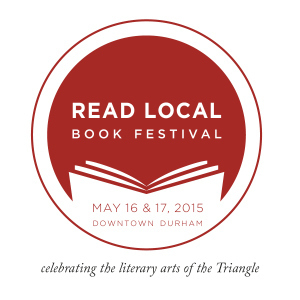 We are fast approaching the inaugural (their fancy way of saying first-ever-hopefully-of-many) Read Local Book Festival. The festival is a weekend-long event with general proceeds going to the libraries, and embraces local authors, bloggers, publishers, bookstores, and libraries from around the Triangle (Raleigh, Durham, Chapel Hill and beyond). It would be a great time for you NC peeps to wander around a festival and chat with real live local people. There are also some great places to grab a bite or snag a coffee nearby. Perfect Sunday afternoon.
We are fast approaching the inaugural (their fancy way of saying first-ever-hopefully-of-many) Read Local Book Festival. The festival is a weekend-long event with general proceeds going to the libraries, and embraces local authors, bloggers, publishers, bookstores, and libraries from around the Triangle (Raleigh, Durham, Chapel Hill and beyond). It would be a great time for you NC peeps to wander around a festival and chat with real live local people. There are also some great places to grab a bite or snag a coffee nearby. Perfect Sunday afternoon.
I will be there! On Sunday, May 17, you can catch me at my booth at the exhibitor fair from noon till 6:00. I will have a half-table with my two books, info on my upcoming books, sneak peeks into the work of Owl and Zebra Press, and even fliers for a couple friends’ events and online magazine. I will be located under the big tent with sixty other authors in the Fs. Or the Ts? I guess we’ll see which name they go with.
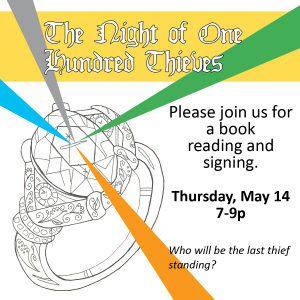 But not until after my reading at The Regulator Bookshop on Ninth Street on May 14! It just happens to be at this really interesting time, like kicking off the whole festival the night before. My books will be for sale and I will be reading and then signing. (By the way, I am looking for book-reading ideas: things that I can do to up the entertainment value of my reading and signing. If you have any suggestions, please let me know.)
But not until after my reading at The Regulator Bookshop on Ninth Street on May 14! It just happens to be at this really interesting time, like kicking off the whole festival the night before. My books will be for sale and I will be reading and then signing. (By the way, I am looking for book-reading ideas: things that I can do to up the entertainment value of my reading and signing. If you have any suggestions, please let me know.)
Here’s the breakdown:
Thursday, May 14
7:00 pm at The Regulator Bookshop on Ninth Street in Durham, Flaherty reading and signing to launch The Night of One Hundred Thieves
Friday, May 15
6:00-8:00pm at Belt Line Station, Cookbook Rodeo. $10 at the door includes demos and tastings
Saturday, May 16
11:00am-12:30pm at the Main Durham County Library, Children’s Literature Workshop
2:00-3:00pm at the Main Durham County Library, Writing Workshop for Children for ages 8-11
5:00-7:30pm, Buffet of Authors dinner with local writers at various restaurants including The Pit, The Little Dipper, and Basan. Choose between Sci-Fi and Fantasy, Nonfiction, and General Fiction. Purchase tickets by May 9
Sunday, May 17
Noon-6:00pm in Central Park in Durham, exhibitor fair with like a hundred booths and stage events. Come by and visit me! It’s free to wander around, but bring some cash in case you just have to take home some local books or a swag bag. Includes readings by home-grown celebrities, spoken word performances, panel discussions, a kid’s craft corner, and author signings
1:00-1:45pm at Durham Central Park Pavilion, Writing for Young Readers Panel
2:00-2:45pm at Durham Central Park Pavilion, Writing About Home Panel
3:00-3:45pm at Durham Central Park Pavilion, Writing About Sex Panel
4:00-4:45pm at Durham Central Park Pavilion, Writing About Social Change Panel
5:00-5:45pm at Durham Central Park Pavilion, Writing About Music Panel
8:00-10:00pm at Motorco, Writers in the Ring battle of the spoken word
If you have any interest, check out the information at www.readlocalnc.org. Or just show up on Thursday to the reading and signing or Sunday for the fair! I would love to see you there, supporting local economy and smaller-time/burgeoning authors. If you read, this will be a great time to discover new authors and titles.


April 29, 2015
Book Review: APE: Author, Publisher, Entrepreneur
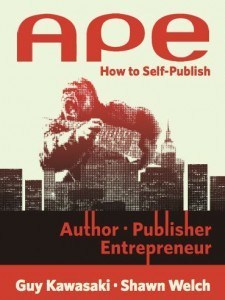 APE: Author, Publisher, Entrepreneur or APE: How to Self-Publish, by Guy Kawasaki and Shawn Welch. I received an e-copy of this book, probably more than a year ago, for some sort of promotion.
APE: Author, Publisher, Entrepreneur or APE: How to Self-Publish, by Guy Kawasaki and Shawn Welch. I received an e-copy of this book, probably more than a year ago, for some sort of promotion.
This book took me forever to read, for two reasons. First, it is an e-book, and I hardly ever pick up my e-reader. Two, it necessitated taking notes, so I only read it when I was in a place with a notebook, pen, and something to lean on. Plus, taking notes of course draws out the process.
But don’t think, therefore, that I was slogging through. I am fine with reading books for my trade, especially when they are good books. And this book easily falls under good-books-for-my-trade. If you are self-publishing or are thinking about self-publishing, this is one of the books that you want to buy and read and have in your library.
Now, it was not the most entertaining read. But it also was not the driest. Somewhere in between, it rests pretty safely in the “how-to” or instructional books category. But it covers a large breadth of material, from why we write to who to pitch to. At times, it glazed over some of the material, but if you want to shoot through and not linger, than this is a great introductory book for you. Also, Kawasaki and Welch keep all of the info up to date (at least so far), so you can be sure you are getting the most recent information in an ever-changing field.
I really don’t have anything else to say about this book. It is informational, accurate, and indispensable if you are looking for a book on how to self-publish. On the other hand, I found Mark Coker’s Secrets to E-Book Success to be a better read, even though it is aligned with Smashwords. And I still love Catherine Ryan Howard’s Self-Printed because it is not only entertaining, but it is super nitty-gritty. If you’re going to self-publish, I would definitely buy and read the newest versions of all three.
To check out the APE website, go HERE.
_______________
RANDOM NOTES:
Publishing is a parallel, not a serial process.
Writing a book is lonely, difficult, and rewarding.
Self-publishing is the best thing that has ever happened to writers.
Self-pub bonuses include: control, longevity, quick revisions, higher royalties, direct connection with readers, price control, time to market, global distribution, foreign rights, analytics, and deal flexibility.
The second thing to do when writing is come up with your 30 second pitch.
Writing is a marathon without people handing you cold water or cheering you on.
Write every day, five minutes even, come hell or high water.
The key to a great book is editing.
Sell 2,500 e-books to break even.
Most authors pursue their dreams while every one else sleeps.
The probability that you will find all errors is 0.
You need your own ISBNs to that printer is not your official publisher.
There is no get-rich-quick and self-publishing.
Add a Reviewing Made East spot to you website.
Underpromise and overdeliver.
TLC: trustworthy, likeable, competent.
Respond to commenters by taking the high ground, don’t argue, and be clear, complete, and concise. @ or mention them.


April 22, 2015
Movie Reviews: Miss Potter and Finding Neverland
So I’ve been too sick to read. Unbelievable, right? Well, actually, sometimes when I get migraines I can’t actually see, so that’s why I couldn’t read. Really throws my everything out of whack. However, I managed to watch two movies the other morning. Not saying I didn’t miss some action happening in the bottom right quadrant, but I think we got the idea.
It is true, I only do writing-related movie and TV reviews for you here. So I will not share all my happy adventures with Anthony Bourdain or Iron Chef, or even the creepy goodness that is Les revenants. Instead, we’ve got too not-so-new fiction movies about real writers, which just came up on Amazon Prime and that I had been meaning to see for a long time.
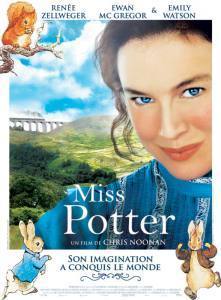 Miss Potter. 2006, directed by Chris Noonan and starring Renee Zellweger and Ewan McGregor. Obviously, the movie is about Beatrix Potter, one of the best-selling children’s book authors of all time, and about her career and love life (or lack thereof). As a just plain movie, I thought it was decent. It was missing some charm that would call me back to watch it again, but it was pretty solid. At times, it got slow, but just barely. The acting was wonderful: the heroine was kinda weird and the hero was awkward and that’s as it should have been. The scenery was lovely. The story was so interesting partly because it was true. You feel so deeply for poor Miss Potter.
Miss Potter. 2006, directed by Chris Noonan and starring Renee Zellweger and Ewan McGregor. Obviously, the movie is about Beatrix Potter, one of the best-selling children’s book authors of all time, and about her career and love life (or lack thereof). As a just plain movie, I thought it was decent. It was missing some charm that would call me back to watch it again, but it was pretty solid. At times, it got slow, but just barely. The acting was wonderful: the heroine was kinda weird and the hero was awkward and that’s as it should have been. The scenery was lovely. The story was so interesting partly because it was true. You feel so deeply for poor Miss Potter.
As a writing movie, it was both good and a little bit bad. I judge writing movies largely on the realistic or unrealistic portrayal of the writing life (and what it can contribute or say). I applaud showing just how long and hard Potter had to cling to her dream before anything happened. I thought it was funny that she was surprised, over and over, with fame and fortune when it did arrive. But the way she ends up is extremely abnormal. Of course, we wouldn’t be making a movie about Potter if she had only scraped by, would we? My issue is not with one or two movies with the same fantastical theme, it’s all of them. I guess it’s like romances? They hardly ever happen in real life that way, but people love to dream about them. Take it with a grain of salt, then, writers! Writing movies are about famous writers. There are a thousand talented and determined writers for every story like that. Or more.
But overall, the story was encouraging. In the movie, at least, Potter was such a strong-willed, courageous, and principled person. After all her hard work, she practically fell into fame (although I hear that her publishing story was a little more complicated than the movie’s plot) and right into a very unexpected romance. From there, you’ll have to see the movie, but it’s a tear-jerker, all right? Potter is a great example of someone who was an artist, a storyteller, to her very core, and she was determined to be a successful author, even though she was unmarried, even though she was a woman, even though she was upper class. And boy did it ever pay off.
The scene that really ripped out my writer’s heart was when her dad brought home a copy of her latest book. Seriously. You’ll have to see it, but it really captures the need writer’s feel to be respected for the work they do. And for that respect to come from those closest to them. Of course, many writers never receive that (and I don’t think Potter every really received it from her mother), but at any rate, it’s a very moving scene. For writers.
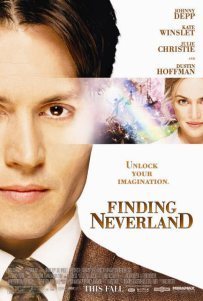 Finding Neverland. 2004, directed by Marc Forster and starring Johnny Depp and Kate Winslet. And this one is about J. M. Barrie, the author of Peter Pan, who strikes me as much more of the usual playwright/writer kind of fellow, with his work spotty and his personal life a mess and all that nonsense. And perhaps nonsense is a good word for my review of this movie. It was nonsense. The idea was good, real good, but the execution was nonsense.
Finding Neverland. 2004, directed by Marc Forster and starring Johnny Depp and Kate Winslet. And this one is about J. M. Barrie, the author of Peter Pan, who strikes me as much more of the usual playwright/writer kind of fellow, with his work spotty and his personal life a mess and all that nonsense. And perhaps nonsense is a good word for my review of this movie. It was nonsense. The idea was good, real good, but the execution was nonsense.
Let me explain. I love the idea of introducing magic into a realism movie (it’s called magic realism) and this movie is a perfect venue because you have a man who is being re-drawn into his own stunted childhood through the childhoods of others and in the meantime he ends up creating one of the most timeless pieces of fantastical literature of all time. Perfect, right? Not in execution. First off, the magic bits were awkward and too sparse. Nuff said. Second, the moral of the movie was “Just believe.” Like, at the end, we have a man and a boy dressed in black and the man is telling the boy with all the gravity and wisdom of his life: “Just believe.” Don’t. Make. Me. Barf. He just said his mom died! This is the most tired, most ridiculous theme in American film and literature, and it is extremely prevalent. That does not make me like it more.
Third, it’s too slow. I don’t know when two hour movies became the norm, but most movies feel best at an hour and a half. This is one of them. Fourth, I don’t like broken marriages. You’re supposed to be all like, “Oh, well poor Johnny Depp is having a cold bit with his wife and she doesn’t really understand him, so it’s cool if he just wanders off everyday to hang out with a few boys and their lovely, widowed mother.” Uh-uh. That does not make a successful love story for me, at all. In fact, I had the distinct feeling at the end of the movie that I could not count on Barrie to raise those boys consistently. Why? Cuz clearly he sucked at commitment.
I think this movie could have been an interesting movie about a playwright coming into his own, about an imperfect man showing a glimpse into the creative mind that started it all. I think the story about his foundering career, his failing marriage, and his relationship with the fated Davies could have been a part of that story. But I don’t think making him the bumbling hero was the answer, or even making her the north star of an awakening. And I think we belonged more in Neverland.
On the other hand, it’s always fun to watch a movie about someone’s writing process. The more journals on screen, the better! J. M. Barrie seems so mortal in this film. Neverland seems to come from a real life. And people thought he was nuts. Of course, the best part of the film was when he brought in orphans to see the play’s opening. While predictable, it forced new thinking on the social elite and caused them to actually enjoy their basic entertainment. It underlines that artists and writers need to be fore-thinkers, pushing the boundaries and testing the limits, being bold and innovative and exciting. Barrie didn’t just write a great play, he invited people outside of the proper socioeconomic class and age group in order to enhance the experience. He had vision, which can make all the difference.
In other words, I would recommend Miss Potter for a quiet, rainy afternoon with a hot tea and a box of tissues. I would not–despite the other reviews–recommend Finding Neverland. You’ll be sad to see such great acting wasted on fluff. Or you won’t. No saying you have to listen to me.


April 15, 2015
Book Review: The Fault In Our Stars
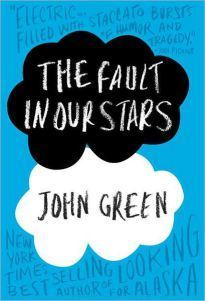 The Fault In Our Stars, by John Green, published in 2012 by Penguin.
The Fault In Our Stars, by John Green, published in 2012 by Penguin.
I was simply seeing this book everywhere. Everyone seemed to love it. So I added it to the Best Books TBR (to be read) and put it out of my head. Until a friend posted on Facebook that her copy was looking for a home. I bumped it up on the TBR queue, I picked it up, it read extremely fast, and now here we are at yet another review.
It’s hard to review a book like this. It’s a difficult book, all ’round. It is, after all, about terminal cancer and teenagers: it’s about kids dying. So you want to treat it carefully and kindly and not offend any dying kids. On the other hand, it is a book by a guy who is not dying of cancer. It is fiction. It is literature. So you want to review it the same way you might any other book.
Let me just say this before I get truly started. The content will very most likely make you cry or maybe just grieve in some way. I would not recommend it for someone actually with terminal cancer or even going through the cancer battle with someone else. You might disagree with me, but I think the book is anything but a helpful support for a current cancer patient, even though they be in the YA category. I would suggest like tens or hundred of books before this one, in that case.
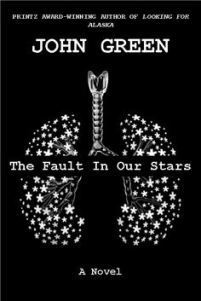 Now for the “real” review. And let’s just hit it straight from my first impression on the table at Barnes & Noble. Terrible cover. Terrible title. In fact, I dislike the cover so much, I have included a photo for an option (done by some person on the internet whose identity I could not discover) to the right. Just so you can see what the cover should look like. I think the cover is a lovely shade of blue, yes, but so over-the-top ambiguous. This isn’t a book about nothing. In fact it is a very specific sort of book. The kind of book you want to go into with eyes wide open. So why be so vague? And not even visually balanced. And did anyone in the whole, wide world read the nearly invisible words telling us this author is a NYTimes bestseller or that the book is funny and tragic? Because I sure didn’t. As for the title, just a little more ambiguity thrown in with pretty awkward grammar that registers later in your memory as “It was some sort of phrase riddled with prepositions and having a faint hint of something philosophical.” Therefore, I was not expecting much.
Now for the “real” review. And let’s just hit it straight from my first impression on the table at Barnes & Noble. Terrible cover. Terrible title. In fact, I dislike the cover so much, I have included a photo for an option (done by some person on the internet whose identity I could not discover) to the right. Just so you can see what the cover should look like. I think the cover is a lovely shade of blue, yes, but so over-the-top ambiguous. This isn’t a book about nothing. In fact it is a very specific sort of book. The kind of book you want to go into with eyes wide open. So why be so vague? And not even visually balanced. And did anyone in the whole, wide world read the nearly invisible words telling us this author is a NYTimes bestseller or that the book is funny and tragic? Because I sure didn’t. As for the title, just a little more ambiguity thrown in with pretty awkward grammar that registers later in your memory as “It was some sort of phrase riddled with prepositions and having a faint hint of something philosophical.” Therefore, I was not expecting much.
I really thought it was a better-than-decent book.
On one hand, it is full of contradictions, unrealistic portrayal of the teen age group, and lacks a little in the plot department. I don’t know how much I can expound on this. Maybe I’ll repeat it. Characters are inconsistent at times. Teenagers are portrayed (as is somewhat popular) much wiser, sophisticated, and cooler than they ever are (even for those that have been confronted with tragedy, etc.). Since this is fiction realism, it didn’t work right for me. The plot is meandering, and you’re rarely sure where you are headed… yet you always sort of know what is happening overall long before you get there.
On the other hand, it is addictive and full of wonderful moments. The writing does sparkle every once in awhile. You breeze through the thing and you don’t want to put it down until you’ve finished.
Warning: teen sex. Sorry, but I do not take teen sex lightly. Nor do I really want to read about it. We’re not talking graphic stuff here, and you see it coming from like 100 pages off… It does make you wonder about what rules you might break if you or your child had terminal cancer. Just know that it’s there. I, for one, could have done without it.
Another warning of sorts: Everything in this book is about cancer. I mean everything. It sorta makes sense, because it is YA. And in case you didn’t know the specs for the YA genre, it’s not just about age of characters or a maturity rating. YA books are also introspective, sometimes suffocatingly so. This book falls into that “suffocatingly so” category. There was never a moment of Hazel’s story (or even her day, presumably) that wasn’t about herself and about cancer. Very high school. I was just longing for Hazel to reach outside of herself. Longing. I suppose that’s where Augustus Waters comes in, but he just adds another layer of self-preoccupation in the disguise of a friendship/love story.
And one last note: despite what some others claim, this book is not humorous. At best, it’s wry. The main character is mildly funny in a very dry and ironic way. But I seriously doubt you will do more than that little breath of air that escapes your nose when something is sorta humorous. It’s a drama, and all good dramas have some humor.
To be fair, let’s include this: John Green was listed in 2014 as one of the world’s 100 most influential people. The Fault In Our Stars was a #1 NYTimes bestseller, and the movie opened at box offices at #1, as well. Green has won no less than seven other books awards in his (so far) short career. His other books include Looking for Alaska (2005), An Abundance of Katherines (2006), and Paper Towns (2008). All of them are YA, but I hear great things about Looking for Alaska and Paper Towns (which is being made into a movie).
Overall, it’s not like I’m running out to read more John Green, although I hear he has better. But it was a very interesting read and for the most part I would not discourage people from reading it.
_______________
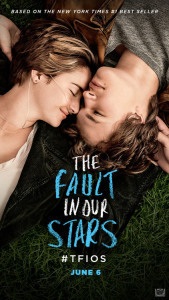 I had every intention of watching and reviewing the movie for you, but getting my hands on an affordable rental copy seems to be a dead end. If I decide to re-add DVD discs to my Netflix soon, I will review it and post the review here. Until then, Redbox lies.
I had every intention of watching and reviewing the movie for you, but getting my hands on an affordable rental copy seems to be a dead end. If I decide to re-add DVD discs to my Netflix soon, I will review it and post the review here. Until then, Redbox lies.
_______________
QUOTES:
“Neither novels nor their readers benefit from attempts to divine whether any facts hide inside a story. Such efforts attack the very idea that made-up stories can matter, which is sort of the foundational assumption of our species” (p -1).
“But, in fact, depression is not a side effect of cancer. Depression is a side effect of dying” (p3).
“…waiting, as we all do, for the sword of Damocles to give him the relief that he escaped lo those many years ago when cancer took both of his nuts but spared what only the most generous soul would call his life. AND YOU TOO MIGHT BE SO LUCKY!” (p5).
“There is only one thing in this world shittier than biting it from cancer when you’re sixteen, and that’s having a kid who bites it from cancer” (p8).
“‘I bought them a minute. Maybe that’s the minute that buys them an hour, which is the hour that buys them a year. No one’s gonna buy them forever, Hazel Grace, but my life bought them a minute. And that’s not nothing'” (p59).
“‘Some tourists think Amsterdam is a city of sin but in truth it is a city of freedom. And in freedom, most people find sin'” (p157).
“You have a choice in this world, I believe, about how to tell sad stories, and we made the funny choice” (p209).
“…only now that I loved a grenade did I understand the foolishness of trying to save others from my own impending fragmentation: I couldn’t unlove Augustus Waters. And I didn’t want to” (p214).
“All I know of heaven and all I know of death is in this park: an elegant universe in ceaseless motion teeming with ruined ruins and screaming children” (p308).



